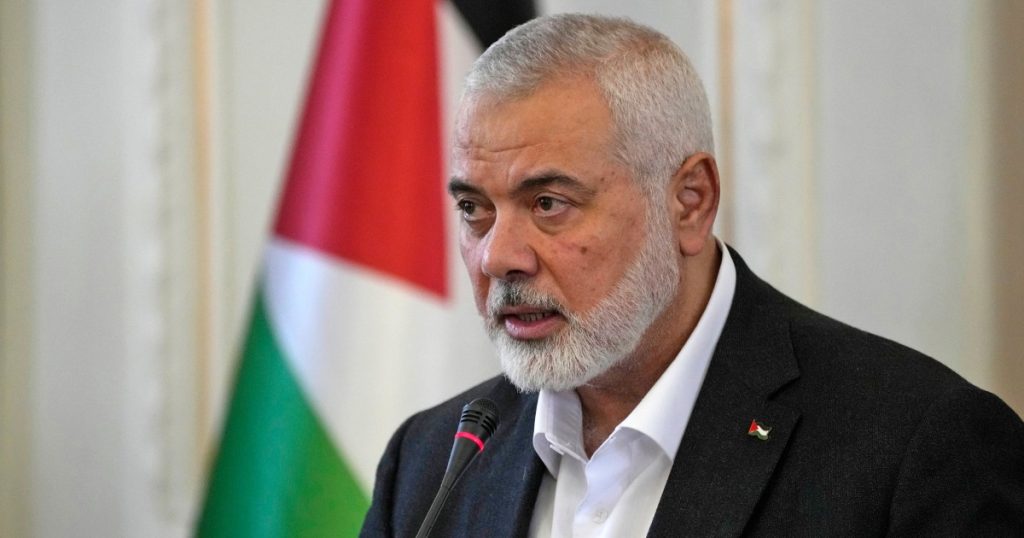Three sons of Hamas leader Ismail Haniyeh were killed in an Israeli airstrike in the Gaza Strip, according to relatives and official Hamas media. Haniyeh accused Israel of acting in the “spirit of revenge and murder” and confirmed the deaths in an interview with Al Jazeera. He stated that his sons were martyred on the road to liberating Jerusalem and the Al-Aqsa Mosque. The Israeli army did not immediately comment on the incident. Haniyeh, who lives in exile in Qatar, condemned the killings and stated that they would not pressure Hamas into softening its positions in cease-fire talks with Israel.
The strike resulted in the deaths of three sons of Ismail Haniyeh, along with other family members, near the Shati refugee camp in Gaza City. Hamas’ Al-Aqsa TV station identified the brothers as Hazem, Ameer, and Mohammed Haniyeh. The strike was carried out by an Israeli drone targeting a single vehicle in which the family members were traveling. The incident occurred as international mediators are trying to broker a new cease-fire agreement between Israel and Hamas, and it remains unclear how the strike will impact these talks. Israeli war cabinet minister Benny Gantz claimed that Hamas has been defeated militarily, but also acknowledged that the fight against the group will continue for years.
Hamas and Israel have been engaged in talks aimed at reaching a cease-fire agreement in exchange for the release of hostages captured by Hamas. However, the two sides remain far apart on key issues, including the return of Palestinians to northern Gaza. Israel’s Security Cabinet recently met to discuss the hostage negotiations but did not make any decisions. The strike that resulted in the deaths of Ismail Haniyeh’s sons came as Palestinians in Gaza marked Eid al-Fitr, the holiday ending the holy month of Ramadan. Residents visited graves of loved ones killed in the war, reflecting on the destruction caused by Israel’s offensive in response to a deadly Hamas attack on October 7.
Ismail Haniyeh condemned the Israeli strike on his sons as unjust and driven by revenge and murder. He emphasized that the killings would not lead Hamas to change its positions in ongoing cease-fire talks, dismissing any notion that targeting his family would alter the group’s demands. Haniyeh’s sons were among several family members killed in the strike, which targeted a vehicle as they were traveling near the Shati refugee camp in Gaza City. The incident comes amid efforts by international mediators to broker a new cease-fire agreement between Israel and Hamas, with the outcome of those talks uncertain in the wake of the strike.
Israeli war cabinet minister Benny Gantz claimed that Hamas has been militarily defeated but acknowledged that the fight against the group will continue in the years to come. He stated that Hamas fighters have been eliminated or are in hiding, and their capabilities have been crippled. Gantz reiterated Israel’s commitment to targeting terrorist locations in the Gaza Strip, indicating that the conflict with Hamas will persist despite military setbacks for the group. The strike resulting in the deaths of Ismail Haniyeh’s sons occurred as Palestinians observed Eid al-Fitr, visiting the graves of loved ones killed in the conflict and reflecting on the ongoing violence in the region.
The Israeli airstrike that killed three sons of Hamas leader Ismail Haniyeh has raised tensions between the two sides, with Haniyeh accusing Israel of acting with vengeance and not valuing any standards or laws in its actions. The incident has cast a shadow over cease-fire talks between Hamas and Israel, with the precise impact of the strike on those negotiations yet to be determined. Hamas’ Al-Aqsa TV station identified the brothers killed in the strike, which also claimed the lives of other family members, near the Shati refugee camp. The strikes occurred as Palestinians commemorated Eid al-Fitr and visited the graves of those lost in the conflict, underscoring the ongoing crisis in the region despite efforts to reach a truce between the warring factions.


